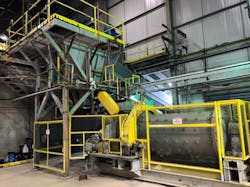Battery Materials Mining Firm commissioning Recycling Demonstration plant in Toronto
Electra Battery Materials has started the commissioning of its black mass recycling demonstration plant at its battery materials park north of Toronto.
“Automakers are looking for a closed-loop supply chain for their batteries and Electra’s recycling process presents a compelling solution to move to a circular model for recycling end-of-life batteries and battery manufacturing scrap Electra Battery Materials CEO Trent Mell said. “Pending completion of the demonstration plant and a review of project economics, success could pave the way towards the buildout of a 5,000 tonne per annum black mass processing facility within our battery materials park in Ontario using existing infrastructure, personnel, and lab facility. Additional capacity would be added through construction of additional modules as the market for recycled battery material expands.”
The firm is retrofitting its cobalt sulfate refinery in Temiskaming Shores, Ontario to accommodate the new hydrometallurgical process for treating black mass. The latter is a byproduct of recycling end-of-life EV and other lithium-ion batteries.
Electra expects the lab-tested process will enable the firm to recover high-value elements from lithium-ion batteries, such as nickel, cobalt, lithium, manganese, copper, and graphite.
Read more of EnergyTech stories on the Energy Storage sector
Electra intends to process as much as 75 metric tons of material in a batch mode. It also expects full commissioning of all equipment and circuits of the black mass recycling demonstration by Fall 2022. The commissioning of the cobalt sulfate refinery is expected in Spring 2023.
“Consistent with our strategy, integrating battery materials recycling to our cobalt sulfate production activities at our refinery will not only serve as an important differentiator but will allow us to generate incremental cash flow while strengthening our relationships with various stakeholders that make up the North American EV supply chainMell said.
A benchmarking study has been completed showing that the carbon intensity of the cradle-to-gate battery grade nickel sulfate derived from the recycled black mass is 50% less than that produced from the mixed hydroxide precipitate when non-renewable energy is used.
At the Ontario facility, hydroelectric from Ontario Power Generation is used as the primary source of power, resulting in near-zero GHG emissions.
